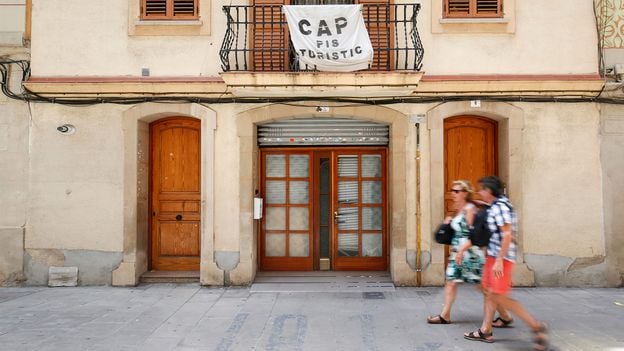On 21 June, Barcelona mayor Jaume Collboni announced plans to ban short term rentals in the city starting in November 2028. The decision is designed to solve what Collboni described as “Barcelona’s biggest problem” – the housing crisis that has seen residents and workers priced out of the market – by returning the 10,000 apartments currently listed as short-term rentals on Airbnb and other platforms into the housing market.
Barcelona is not the only city to be strongly regulating – or even banning – short-term rentals outright. It has been illegal since September 2023 to rent out an apartment as a short-term let in New York City unless you are registered with the city and you are present in the apartment when someone is staying – a change also made to assuage the city’s housing crisis. Berlin banned Airbnbs and short-term rentals back in 2014, bringing them back under tight restrictions in 2018; and in many of California’s coastal cities, including Santa Monica, short-term rentals are either banned or highly restricted.
In British Columbia, Canada, Premier David Eby put the issue succinctly as he clarified new short-term rental rules: “If you’re flipping homes, if you’re buying places to do short-term rental, if you’re buying a home to leave it vacant, we have consistently, publicly, repeatedly sent the message: Do not compete with families and individuals that are looking for a place to live with your investment dollars.”
It hasn’t even been in existence for 15 years, literally any adult with an income can imagine what life without Airbnb is like.
While that’s true, short term (vacation) rentals existed well before airbnb, they just weren’t so prevalent.
Yes, rentals existed before Airbnb but they were not monopolized by a foreign multinational company that is causing housing crises across the planet and that operates outside of legality
Agreed.
I see people posting questions about life in the 1970s and wonder, “Don’t you know any one who was around then?”
They aren’t banning Airbnb. They are banning short term rentals. Huge difference. You can do long term rentals on Airbnb, and you can do 2 day rentals on other websites like VRBO. Those other sites have been around for a very long time.
AirBnB was founded in 2007.
So almost everyone who is an adult knows what things were like before AirBnB.
Personally, despite having taken advantage of them (others have paid), I would like to go back to how things used to be.
For one thing, making sure I clean up is not what I should be worrying about when traveling.
You’re not forced to use their service. Same way you aren’t forced to use hostels.
That said, I’d like them gone for other reasons. I liked the original idea for the service, not what it’s become. It’s really fucked up some areas.
Not being forced to use a bad thing doesn’t make it not a bad thing.
I’m not forced to drive a car either - but if I try to ride my bike someplace, I’m likely to get run over by someone else’s car, so…
Short term rentals would be fine if companies like Airbnb weren’t getting a cut. Like they existed on Craigslist and as actual bead-and-breakfasts way before airbnb et al existed.
I imagine people are willing to give a cut to Airbnb because they perceive, rightly or wrongly, that Aribnb is taking care of all the details. Insurance, liability, blocking troublemakers, data and time coordination etc.
I use to travel a lot before airbnb existed, and most of it was to uhh, old school bnbs.
Lovely! Amazing! But maybe that was just the areas we were going to were amazing. I wonder how well they’d work in cities and such? All my experiences were in much more rural areas, so you got a lot more room and such.
The problem isn’t that AirBnB gets a cut, the problem is that they make such a process more efficient and accessible. Property is a finite resource, especially when talking about a specific area like a city. We don’t want to turn cities into amusement parks that the workers have to commute an hour to get to, even if that’s what is the most profitable. Housing should be affordable and available for the people who actually use and make the city run daily.
Airbnb is yet another monstrosity created by neoliberalism that is completely amoral and aims for profit above all things
created by tech bros
Neo liberalism is a Boogeyman that means literally nothing thanks to everyone calling everyone else it. The real issue (with Airbnb) is that tech bros decided to create a business solution to something that in all honesty wasn’t a problem and now we’re here. The same can be said for Uber, and all the other “gig economy” companies.
In my country, Uber fixed a lot of problems that existed with Taxis.
- Sometimes taxis wouldn’t show up.
- Sometimes taxis wouldn’t pick up certain people because of how they look
- There was no app that’d show you where the nearest taxi was and when it’d arrive. I’m not aware of any taxi company that has such an app now…yet there’s an app that’ll show you where the busses are (even across different transit agencies)
- You wouldn’t know how much your trip would cost until you arrived at your destination.
- Drivers would take longer routes or otherwise drive in “favourable ways” to increase the fare meter.
- In my experience, taxi drivers have been more rude than Uber drivers
- Taxi drivers would occasionally not accept certain methods of payment upon trip completion (and some would even try to use this trick to scam their passengers and likely their companies or the government by not reporting fares).
These all could’ve been solved by a regular taxi company, but I guess there was no incentive to make the product any better to the customers.
Over here in Germany, they ran against a brick wall:
- Taxi apps already existed. Pioneers were taxi.eu, where a consortium of local dispatchers plain and simply introduced another way to access their services, and what’s now called Free Now, circumventing the old dispatchers, directly connecting clients and individual, licensed, taxi drivers. Both predate uber’s founding, and definitely uber’s introduction into the market here.
- Regulations exist. Taxis are classed as public transport, prices are regulated, no congestion pricing, no not taking on a passenger to the outskirts because you wouldn’t get a return fare, no nothing. On the flipside you need a license so that there’s few enough taxis around for every driver to still be able to make a living. Uber didn’t care a bit about that kind of stuff, bringing us to
- Regulations are enforced. Drivers taking uber fares without both taxi and passenger transport license were looking at court orders giving slaps on the wrist, but also threatening 1000 Euro fines for every subsequent passenger transported without proper licensing.
Oh:
- Public transport is a thing. Most trips are covered by buses, metros, etc, more rural areas by collect taxis. Needing to hail an individual one is very rare, I think most of their fares are from people with too much money on hand. Also if you need to hail that taxi chances are your health insurance is going to cover the cost they prefer you hauling your broken leg to the doctor with a taxi, transport ambulances are more expensive and it’s not like you need medical supervision on the trip, or the thing would need to accommodate a wheelchair or such.
All that sounds great. I’m not pro-Uber so much as I’m anti-Taxi (as they exist where I live), lol
Sometimes taxis wouldn’t pick up certain people because of how they look
Unfortunately, at least in the US, Uber is just as bad. I’ve got a friend who’s blind and has a service dog - Uber drivers legally can’t decline a ride because he’s got a service dog, but very frequently they’d pull up, see the dog, and cancel the ride. Taxis are more likely to know and follow the law.
Thankfully taxi services have finally gotten off their ass and most large cities have a taxi app. I used to fucking hate taxis because I never carried cash and the driver would get all huffy when I wanted to use card despite clearly having a card machine. I know most of it was they prefer cash to skirt taxes and also avoid the card fee (which they could add to the charge) but sorry, not sorry.
Uber came along and card was the default and you knew how much the ride would be before you even called them. No more guessing how much it would cost and having to pay attention to make sure the driver isn’t taking a scenic route to drive up the meter.
Neo liberalism is a Boogeyman
that tech bros
Pot, meet kettle.
Techbros are a very real and rather well defined term and collection of people.
Neoliberals not so much.
update:
https://www.urbandictionary.com/define.php?term=Neo-Liberal
vs
https://www.urbandictionary.com/define.php?term=Techbro
notice how the definitions are much more consistent for a techbro.

Can you tell us more about these techbros? Are they with us now in this room? Do they sometimes tell you to do things, bad things?
I invite you to read my updated comment asshole :)
Nah I’m good, kettle.
presents information that would lead to a meaningful discussion even though it contradictions your point
nah I’m good
You’re exactly as bad as the people you complain about.
Removed by mod
I do not use AirBNB anymore. I just use hotels or actual BNBs.

Why do people hate on Aribnb so much? I mean I don’t like what they’re doing to the housing market, yes, they’re inflating housing prices by reducing the incentive to sell, and there’s a housing crisis basically everywhere right now. But the product itself is quite good. It may be the largest one but there are still competitors, and the prices are typically far cheaper than a hotel. When I look at e.g. Croatia and the coastline, on Šolta for example you literally have a single hotel that’s wildly expensive, or short term rentals. I know I’d definitely never go for the hotel personally.
Also I don’t get the “tech bros solving nonexistent problems argument”. Like sure, technically you could do it yourself without the website, but that’s like saying that why would anyone make a flight aggregate site or Ebay. Those things are possible via other methods, but this makes it far easier.
Like I legitimately want to know what people’s problems are with the actual product, cuz from my perspective it’s pretty good. I agree that it perpetuates overarching problems like overturism or the housing crisis, but I’m talking about the app and service itself which a lot of people here seem to have a problem with.
I mean I don’t like what they’re doing to the housing market, yes, they’re inflating housing prices by reducing the incentive to sell, and there’s a housing crisis basically everywhere right now.
errrr…you said it right here. AirBnB is created to do exactly that. the product isn’t good. the product is designed to create inflated housing prices. to make landlords even more rich and more able to exploit poor people. look at some tourist-y cities, where the original residents can no longer live in their houses, because it’s SO MUCH more profitable to rent per day on airbnb than to have normal rents. airbnb doesn’t provide anything. it doesn’t add anything positive. hotels are too expensive, maybe. but they have a service. they have some guarantees, room service, food, you’re guaranteed to have a room to sleep in by yourself. NONE of these are guaranteed with AirBnB. you can easily rent a room where you have to sleep with another person, clean up by yourself, pay stupid deposits,…
what even is ONE positive out of Airbnb?
what even is ONE positive out of Airbnb?
It enables random Joes with an extra room or even couch or away for a while to actually find someone to take up their offer. Airbnb was one of the many couchsurfing platforms back in the days, one that managed to have global appeal and thus rushed ahead, and back in the days the offers were indeed of the bed and breakfast type at most. More commonly, “yeah we have a convertible couch and yep there’s some cheerios if you want”. Or even “hey we have a farm and there’s hay in the barn to sleep on there’s going to be potatoes, onions, eggs and ham for breakfast”. That’s good allocation of resources, and the likes of airbnb help using those resources more efficiently.
Investment sharks swooping in has been regrettable, but the only reason they were able to was because cities etc. had insufficient regulations. They didn’t bother to before because the micro-hotel business was negligible and didn’t have any noticeable market impact, now it does and thus they need to regulate.
And at least the Berlin regulations are furnished precisely to bring these kinds of platforms back to their original purpose: You can either yourself live in the apartment while the guest is there, or you can restrict your rental to a couple of weeks per year, if you don’t, you need a hotel license. And there’s no hotel licenses to be had for apartments in a residential zone in a housing crisis. If you’re trying to skirt those regulations you’ll soon find out that finance ministries in Germany have their own police forces. Especially in Berlin you have literally the whole population to deal with, a population which carried a referendum to socialise landlords owning more than 1000 apartments, they are going to rat you out.
The issue here isn’t the idea of micro rentals, those have existed since time immemorial, the issue is capital capturing politics to avoid having proper regulation put into place so that they can exploit market failure.
No the issue is literally the micro rentals. Because before that, we had couchsurfing. Which was all the great things about spending time in a different city staying with locals WITHOUT stupid infrastructure to fuck up the whole country
There was no infrastructure to find these kinds of opportunities unless you knew a guy who knew a guy. The likes of airbnb were what enabled the spread of couchsurfing in places you did not have a prior connection to in the first place. Then bread and breakfasts and smaller hotels started getting onto the platform as it was a way for them to get customers, not having the name recognition and own infrastructure that big hotel chains have. Then, years later, came the fucks buying up multiple apartments to turn them into short-term rentals.
I’ll readily blame airbnb for not nipping that behaviour in the bud themselves but also that’s just not how VC investment works, they had no chance at that point. I’m generally not a fan of how Silicon Valley companies act regarding regulations but unlike e.g. uber airbnb hasn’t been trying to skirt them and find loopholes left and right, only thing they’ve been whinging about, particularly in Berlin, is that the administration doesn’t have its IT shit together and is generally slow, and pointed to Hamburg of all places as something to imitate. Very smart of them: “You’re worse than Hamburg” is one of the few viable ways to motivate Berliners to do anything. The other is to dangle VIP tickets to Berghain in front of their noses.
I’ve given up on AirBnB in the last few years. When I first started, you could get great places for cheaper than hotels and it felt exciting having a house to yourself. I don’t know if the novelty has worn off or if the quality has got worse, but the last few times I’ve used it I’ve regretted it. “Check-in” is never simple. Bad directions to the place. Bad communication leading to issues trying to get the key. Stupid rules like having to put bedsheets in the wash. Reviews can’t be trusted. And it’s not even much cheaper than hotels now.
This doesn’t go for every AirBnB, I’m sure plenty are great. But a lot of times you don’t want the uncertainty.
If people kept setting fire to your house with a flamethrower, would you care about the quality or effectiveness of the flamethrower?
I think the stated purpose of Airbnb is fine, allowing people to rent out their homes for short term while they’re off vacation or something. I think the reality of what actually happens is pretty not okay, people buying properties all over and only ever renting them using Airbnb without ever actually living there and while preventing anyone else from living there
Maybe hotels should cost less money and they wouldn’t have as much competition from clearly inferior products.
Removed by mod









